
Venomous Marine Life
Diver with a venomous Stingray.
The venomous marine life of South Africa are found all along the coastline of the country, and although some pose little threat to humans, there are a few to know about before you go on an oceanic adventure. Venomous marine life are aquatic animals that can be harmful to humans if they come in contact with their stinger, tentacle or liquid. Most of these animals live far beneath the ocean's surface, but it is important to know which to look out for.
Venomous marine life who sting include jellyfish, bluebottles, anemones and starfish. Sea sponges can cause inflammation on the skin, and it is best to avoid touching sea cucumbers and fire corals. Beware of stingrays, scorpionfish, toadfish and catfish as they have sharp fins through which they deliver venom. Squid, octopus and inkfish are to be avoided as well. It is best to look and admire from afar than to come into contact with any of the above mentioned animals.
If you are intersted in learning more about these interesting creatures, dive into the Marine Guide of South Africa Online ®
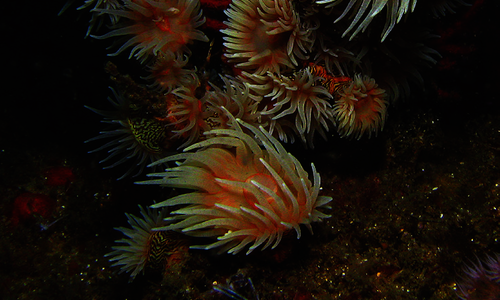
Anemones belong to the Actiniaria order which consists of 44 families and more than 1000 species. Some anemone species live in tubes or burr...
more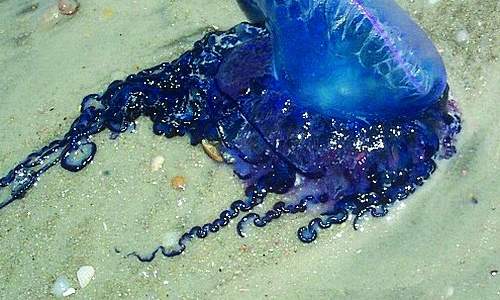
Bluebottles belong to the Physaliidae family which is a part of the Siphonophora order. It comprises of four distinct individuals – the fl...
more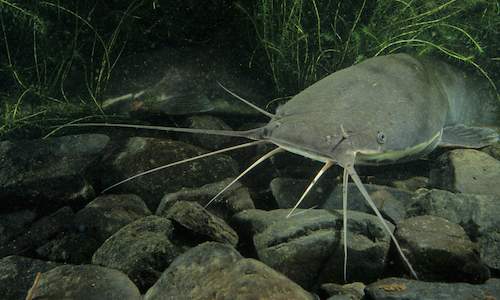
Catfish have long bodies that are at times shaped similarly to that of an eel, and their tailfins are forked. They have two to three pairs o...
more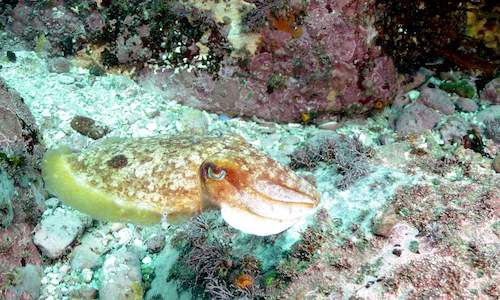
Sepiida order falls under the class Cephalopoda which includes octopus, squid and nautilus. Often confused with squids (which don’t have t...
more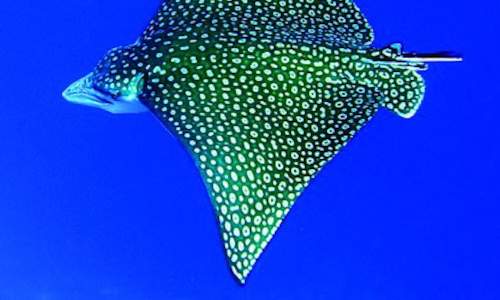
Myliobatidae family consists of 7 genera and 42 species. Very fast swimmers. Tail is longer than the body. Some of the Eagle rays have a sno...
more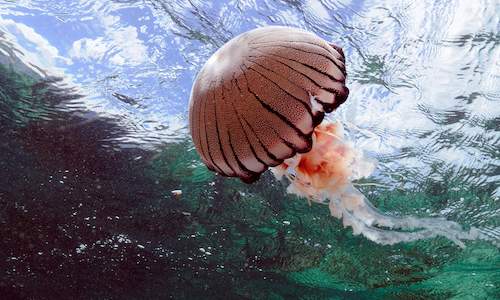
Hydrozoa class in the phylum Cnidaria consists of approximately 1 750 species. Closely related to corals and anemones. They swim by contract...
more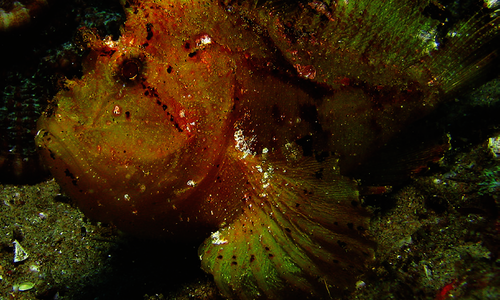
Leaf Scorpionfish have flattened bodies and tiny heads. Their dorsal fins are in the shape of a sail, running continuously from above the ey...
more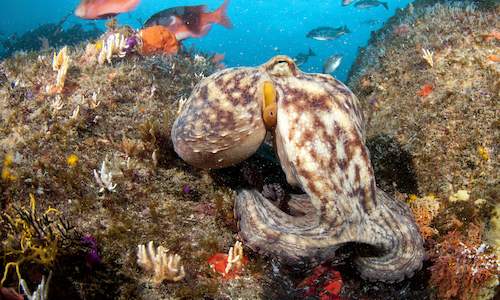
The octopus belongs to the octopoda order which falls under the cephalopoda class. This class includes cuttlefish, nautilus and squid. Inter...
more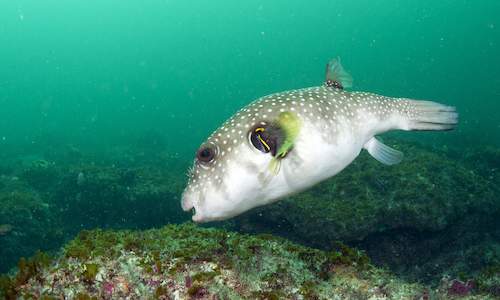
Pufferfish belong to the Tetraodontidae family which comprises of 19 genera and 121 species. They use their pectoral fins to propel themselv...
more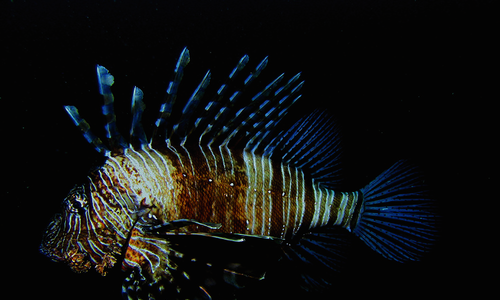
Red Lionfish belong to the Pterois genus which comprises of nine species. They are well camouflaged, docile creatures that are not easily sc...
more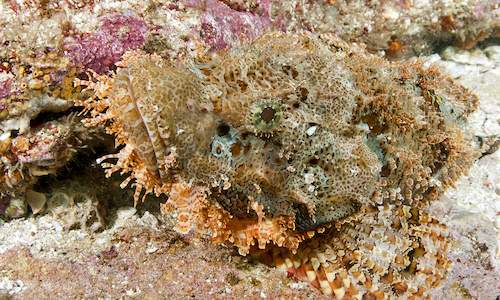
Scorpionfish belong to the Scorpaenopsis family which comprises of 26 species. They occur on coral reefs, lying very still and camouflaging ...
more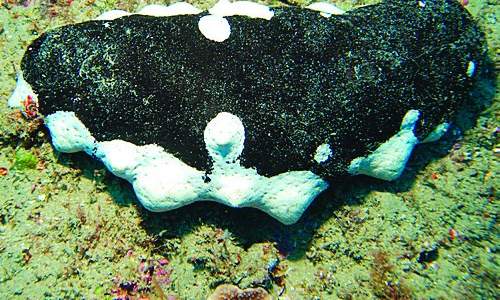
Sea cucumbers belong to the Holothuroidea family which falls under the Echinodermata phylum class. This includes sea urchins and all the sta...
more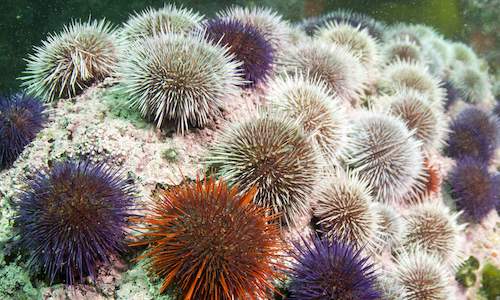
Sea urchins are a part of the Echinoidea class which falls under the Echinodermata phylum, which includes sea cucumbers and all the stars �...
more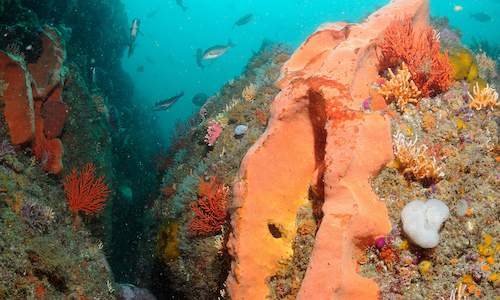
Sponges belong to the Porifera phylum which comprises of more than 15 000 species. They consist of collagen, lime, silica spicule or sponge ...
more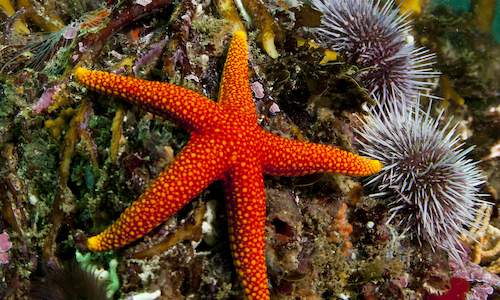
Asteroidea class falls under the Echinodermata phylum, which includes all the Feather and Brittlestars, Sea cucumbers and Sea urchins. Slow ...
more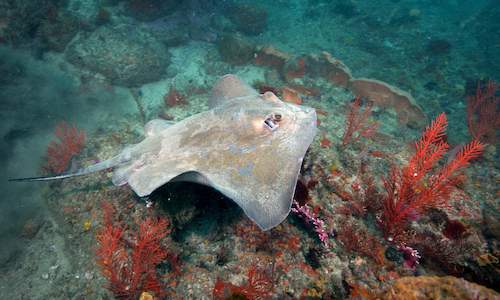
Named after the stinger on their tails. Flat, disk-shaped body with triangular wings. Head not distinguishable from body. Wider than it is l...
more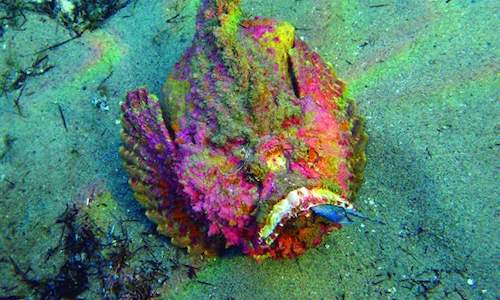
Stonefish belong to the Synanceiidae sub-family which comprises of eight genera and 36 species. The name ‘stonefish’ derives from its ap...
more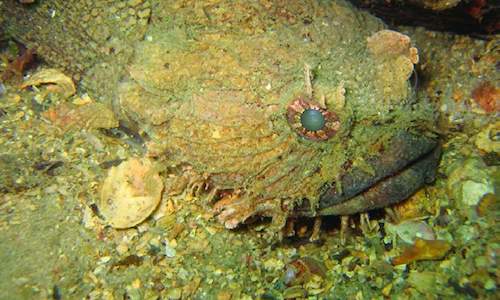
Toadfish belong to the Batrachoididae family which comprises of 23 genera and 80 species. Their name derives from their toad-like appearance...
more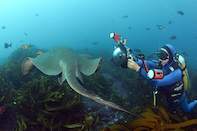
 Anemones belong to the Actiniaria order which consists of 44 families and more than 1000 species. Some anemone species live in tubes or burr...
Anemones belong to the Actiniaria order which consists of 44 families and more than 1000 species. Some anemone species live in tubes or burr... Bluebottles belong to the Physaliidae family which is a part of the Siphonophora order. It comprises of four distinct individuals – the fl...
Bluebottles belong to the Physaliidae family which is a part of the Siphonophora order. It comprises of four distinct individuals – the fl... Catfish have long bodies that are at times shaped similarly to that of an eel, and their tailfins are forked. They have two to three pairs o...
Catfish have long bodies that are at times shaped similarly to that of an eel, and their tailfins are forked. They have two to three pairs o... Sepiida order falls under the class Cephalopoda which includes octopus, squid and nautilus. Often confused with squids (which don’t have t...
Sepiida order falls under the class Cephalopoda which includes octopus, squid and nautilus. Often confused with squids (which don’t have t... Myliobatidae family consists of 7 genera and 42 species. Very fast swimmers. Tail is longer than the body. Some of the Eagle rays have a sno...
Myliobatidae family consists of 7 genera and 42 species. Very fast swimmers. Tail is longer than the body. Some of the Eagle rays have a sno... Hydrozoa class in the phylum Cnidaria consists of approximately 1 750 species. Closely related to corals and anemones. They swim by contract...
Hydrozoa class in the phylum Cnidaria consists of approximately 1 750 species. Closely related to corals and anemones. They swim by contract... Leaf Scorpionfish have flattened bodies and tiny heads. Their dorsal fins are in the shape of a sail, running continuously from above the ey...
Leaf Scorpionfish have flattened bodies and tiny heads. Their dorsal fins are in the shape of a sail, running continuously from above the ey... The octopus belongs to the octopoda order which falls under the cephalopoda class. This class includes cuttlefish, nautilus and squid. Inter...
The octopus belongs to the octopoda order which falls under the cephalopoda class. This class includes cuttlefish, nautilus and squid. Inter... Pufferfish belong to the Tetraodontidae family which comprises of 19 genera and 121 species. They use their pectoral fins to propel themselv...
Pufferfish belong to the Tetraodontidae family which comprises of 19 genera and 121 species. They use their pectoral fins to propel themselv... Red Lionfish belong to the Pterois genus which comprises of nine species. They are well camouflaged, docile creatures that are not easily sc...
Red Lionfish belong to the Pterois genus which comprises of nine species. They are well camouflaged, docile creatures that are not easily sc... Scorpionfish belong to the Scorpaenopsis family which comprises of 26 species. They occur on coral reefs, lying very still and camouflaging ...
Scorpionfish belong to the Scorpaenopsis family which comprises of 26 species. They occur on coral reefs, lying very still and camouflaging ... Sea cucumbers belong to the Holothuroidea family which falls under the Echinodermata phylum class. This includes sea urchins and all the sta...
Sea cucumbers belong to the Holothuroidea family which falls under the Echinodermata phylum class. This includes sea urchins and all the sta... Sea urchins are a part of the Echinoidea class which falls under the Echinodermata phylum, which includes sea cucumbers and all the stars �...
Sea urchins are a part of the Echinoidea class which falls under the Echinodermata phylum, which includes sea cucumbers and all the stars �... Sponges belong to the Porifera phylum which comprises of more than 15 000 species. They consist of collagen, lime, silica spicule or sponge ...
Sponges belong to the Porifera phylum which comprises of more than 15 000 species. They consist of collagen, lime, silica spicule or sponge ... Asteroidea class falls under the Echinodermata phylum, which includes all the Feather and Brittlestars, Sea cucumbers and Sea urchins. Slow ...
Asteroidea class falls under the Echinodermata phylum, which includes all the Feather and Brittlestars, Sea cucumbers and Sea urchins. Slow ... Named after the stinger on their tails. Flat, disk-shaped body with triangular wings. Head not distinguishable from body. Wider than it is l...
Named after the stinger on their tails. Flat, disk-shaped body with triangular wings. Head not distinguishable from body. Wider than it is l... Stonefish belong to the Synanceiidae sub-family which comprises of eight genera and 36 species. The name ‘stonefish’ derives from its ap...
Stonefish belong to the Synanceiidae sub-family which comprises of eight genera and 36 species. The name ‘stonefish’ derives from its ap... Toadfish belong to the Batrachoididae family which comprises of 23 genera and 80 species. Their name derives from their toad-like appearance...
Toadfish belong to the Batrachoididae family which comprises of 23 genera and 80 species. Their name derives from their toad-like appearance...